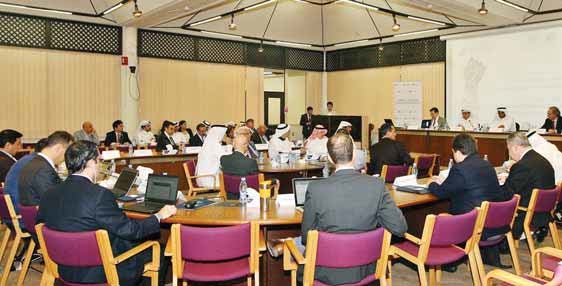Overcoming Sectarian Fault Lines after the Arab Revolutions Conference

A two-day conference entitled “Overcoming Sectarian Fault Lines after the Arab Revolutions” organized by GU-Q and co-hosted by the Gulf Studies program at Qatar University saw a diverse group of participants explore the many facets of rising sectarianism in the Arab world. A selection of scholars from the Kingdom of Saudi Arabia, Bahrain, Egypt, Qatar, the UAE, the UK, Switzerland, the United States, Lebanon, and Turkey took part in the two-day conference, which was enabled by grant CWSP2-W-0414-14046 awarded to Georgetown University School of Foreign Service in Doha by the Qatar National Research Fund (QNRF).
The opening remarks of the conference were given by Dr Humaid Abdullah Al-Midfaa, Vice President of Qatar University, and Dr. Mark Farha, GU-Q assistant professor and event organizer. This was followed by reflections on sectarianism in Arabic by seasoned diplomats H.E. Martin Aeschbacher, the Swiss Ambassador to Qatar, and H.E. Abdullah bin Hamad Al Attiyah, former deputy Prime Minister of the State of Qatar and current President of the Administrative Control and Transparency Authority in Qatar.
“Sectarian sentiments in the region have risen to the fore with unprecedented force in the aftermath of the Arab Spring. Whether between Shia and Sunni, Muslim and non-Muslim, or even within confessions, these increasingly hardening divides demand that we understand their origins, that we confront perceptions, and that we explore non-violent remedies on all levels. That’s what this workshop really sought to do in a rare collaborative effort across campuses and countries,” said Dr. Farha.
The participants presented novel approaches to understanding the rise of sectarianism in the region, taking political, economic, social, and religious factors into consideration. Some of the questions included: What are the historical origins of sectarianism in the region, and how are we to weigh the indigenous and extraneous forces that have shaped its (re)occurrence? Are theological and cultural differences a primary cause or a consequence of conflict in post-revolutionary Arab states? Is sectarianism a deep, visceral instinct inherited from the past, or is it an invention, manipulated by domestic and international actors to aid their pursuit of power in times of political contestation and disorder?
“The questions that we explored in this conference have direct implications on regional foreign policy. It is imperative that we try to devise strategies that are more conducive to overcoming sectarian polarization and religious radicalization, as well as to seek new, preemptive policies that can be implemented to construct a more stable and viable future,” said Dr. Farha.
After a series of engaging discussions by the historians and political scientists, the conference concluded with the experience of one particular NGO (Youth for Tolerance), based in Lebanon, which promotes tolerance and awareness building for students aged 16 to 23 years. Activities range from structured classroom sessions, training camps and student exchanges to themed activities, competitions, citizen journalism and online games. MIT graduate Elie Awad shared the challenges and successes of the NGO in a presentation entitled “Overcoming Sectarianism through Training and Activities for Lebanese Youth: Lessons Learned.”
“The fact remains that the youth in our societies are not properly trained or prepared to deal with religious and political diversity. Instead, they hold deeply rooted beliefs that “others” must be changed, or even worse, eliminated. Through our various activities, we try as civil society activists to teach the concepts of tolerance, that conflicts are never one-sided, and that life doesn’t come in black and white: it comes in full colors. In Lebanon, which is very multi-cultural and often in or near the eye of the storm, this is a particularly relevant lesson,” said Mr. Awad.
The conference was organized by Dr. Mark Farha with the close collaboration of GU-Q alumna, Leena Zahir, who graduated with honors with a degree in International Politics (IPOL) in 2014. She is currently working with Dr. Farha as a research associate on NPRP Grant 6-028-5-006 from the Qatar National Research Fund on “Emerging Sectarian Faultlines After the Arab Revolutions”. The presented papers are being collected and edited for a volume on sectarianism to be published in 2015.
Contributors include:
Prof. Ibrahim Warde, Tufts University; Prof. Tobias Mathiessen, University of Cambridge; Dr. Anwar Eshki, Middle East Institute for Strategic and Legal Studies, Jeddah; Prof. Imad Salamey, Lebanese American University; Prof. Samer Karanshawy, Qatar Faculty for Islamic Studies; Prof. Birol Baskan, Georgetown University in Qatar; Dr. Yahya Hakim, Transparency International; Fatima Ali, Qatar University; Prof. Shahram Akbarzadeh, Deakin University; Hassan Mneimneh, German Marshall Fund; Prof. Lucciano Zaccara, Qatar University; Prof. Khaled Hroub, Carnegie Mellon University, Qatar; Dr. Abdulrahman Azzam, Office of HH Sheikha Moza.